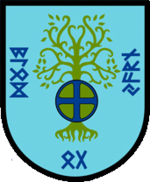Linus Truls Thorgilsson
| Linus Truls Thorgilsson Einhorn | |
 | |
| Former Senator of the Lakes | |
|---|---|
 | |
| Tenure began | 1.I.1708 AN |
| Tenure ended | 24.XV.1712 AN (4 AN years) |
| Senate(s) | IX |
| Elected | 1707 |
| Faction | Humanist List |
| Order of the Holy Lakes | Einhorn |
| Physical description | |
| Gender | Male |
| Species | Human |
| Race | Elw-Norse |
| Biographical information | |
| Father | Kaiser Dominus |
| Spouse(s) |
|
| Date of birth | 1644 AN |
| Date of death | 3.XI.1734 AN (90 AN years) |
| Place of death | Huyenkula |
Linus Truls Thorgilsson Einhorn, born in Shirekeep in 1644, is a Benacian Union–Hurmu–Norse politician, nobleman and diplomat, and the present Secretary General of the Micras Treaty Organization (MTO). Senator of the Lakes, 1708–1712; Hurmu minister of policing and security (1708–1713); Benacian Union ambassador to Hurmu and the MTO (1713–1714), and uncle of the King of Normark. Named beneficiary of the Tarjeisson Trust, legionary commander, and a diplomat affiliated with the Benacian Union. The son of Kaiser Dominus and grandson of Elwynnese prince Tarjei Einhornsson, Linus's early life was characterised by his tutelage under the Tarjeisson Complex Marriage Community Trust. The name of his mother is redacted in official records, but is believed to be Sigrid Haabye Truls, elder sister of Frederik Haabye Truls, who is also believed to have joined a complex marriage with Kaiser Dominus. The theory is further strenghtened with the middle name Truls; in Norse tradition, one often bears one's mother's maiden name as a middle name.
He holds citizenship in the Benacian Union, Hurmu, Normark, and Shireroth.
Biography
While Linus's father died the same year as he was born, during the Oustfest Massacre, Linus developed a fondness for his late father and the Einhorn line and legacy. As such, it was not surprising that Linus, like most his siblings (such as Tarjei and Katja), became a fervent believer in national humanism. After receiving a humanist education in line with the last will and testament of Kaiser Dominus at the Manor of Zahhak in the Bailiwick of Mohamedion, he began a career of public service with serving under the Imperial Forces of Shireroth as a silbir from 1660 to 1665 when he was honourably discharged at the rank of Ænst Fiþnan. Upon returning to civilian life he then enrolled at Metzler University to study law. His studies were delayed with the outbreak of the Kalirion Fracture in 1671, during which he was instructed by the Nationalist and Humanist Party to take up residency in Elwynn and aid with the nascent separatist government there, which later came to be the Elwynnese Republic.
He received a master of legal letters from Ardashirshahr's campus of the People's Academy of Elwynn in 1673, and took on employment in the civil service of the Alalehzamini Autonomous Republic. Over the years in the civil service, he rose in the ranks, and by 1689, he was in charge of the taxation office's legal department. His demeanour and work ethic proved popular, and was noticed by the Command Executive of Benacia Command. He was accordingly recalled to the colours and promoted to the rank of Bivarhins Salbnan on 12.XIII.1689 AN, being thereafter appointed to command of the Saznan Darneï (Secret Guard), replacing Ulfric Pentermacht upon his retirement to join the Society for Benevolent Investment. At which point in became a matter of record, not overly discussed but no longer denied, that Linus had continued in the service of the Imperial Forces after his formal discharge in 1665 AN, becoming an operative of the Shirerithian special forces unit S.W.O.R.D. in that year. S.W.O.R.D. had been deployed into Alalehzamin following the partition of Elwynn by Imperialist and Theocratic forces in 1665 AN. The primary purpose of the deployment was to disrupt the efforts of the Elwynnese Resistance Organisation. As a student at Metzler University who gravitated towards Nationalist and Humanist circles and benefited from his distinguished, Linus was able to identify left-wing radicals amongst the Elw community in Shirekeep and organise for them to be either handed over to the security services for torture and conversion into intelligence assets, or else to arrange for their killing by the militant Humanist cell organised on the campus. With the defection of S.W.O.R.D. to the Black Legions after 1672 AN, Linus was instructed to maintain his cover and to organise the N&H cadres within the Alalehzamini state apparatus. His appointment to command of the most prominent guards legion the Szodanin-Uihmaz (Sovereign's Corps) was a testimony to the regard in which his bureaucratic acumen was held. Linus was able to avoid association with the 1691 AN and 1694 AN coups in Merensk, being deployed away from the capital on both occasions. Spending the majority of his tenure with the Black Legions deployed on the island of Florencia, Linus nonetheless participated in the large scale airborne landings between Highbloom and Northbloom, commenced on 21.XIV.1695 AN as part of the Second Elwynnese Civil War (1692 AN–1696 AN) and was accordingly witness to some of the combat between Pact loyalist forces and the dislocated formations of the rebels and their Kalgachi allies. It should however be noted that, in Linus' own words, the majority of his time during that operation had been spent trying to ascertain his own location after the jump and subsequently with establishing contact with his own staff and thereafter with the other elements of the deployed force scattered across a portion of southern Amokolia and the Northbloom Protectorate.
Prefect of Merensk (1700 AN-1702 AN). Implicated in the conspiracy to depose and judicially murder his predecessor, the legate Lysander Falk.
On 13.III.1702 AN, the High Presidium of the Benacian Union appointed him Legate of the Eastern Apollonian Mission, in effect making him the ambassador of both Elwynn and the Unified Governorates to Hurmu, Lac Glacei, and the International Mandate. Unlike most other ambassadors in Hurmu, his embassy (legation) and residence are not located in Vesüha but in Ghawlama, but he was granted an annual pass for trips on the Hurmu Gate Network between Ghawlama and Vesüha. He was received by Hurmu's collective head of state, Senate of the Lakes, on 5.IV.1702 AN at an accreditation ceremony held at the Palace of the Elenaran,
On 16.X.1707 AN, Linus Truls Thorgilsson received Melika al-Osman as his wife, along with three concubines, in reward for his services to the Benacian Union during the Barikalus-Hurmu war and the Great Vanic Revolt. The wedding ceremony, combining elements of Norse and Babkhan ritual, the payment of ransoms, dancing, singing, toasting, and banqueting, was conducted over the course of a fortnight in Ghawlama.
At one time considered a prospective Prime Minister of Hurmu, the seemingly uncompelled resignation of Daniyal al-Osman, with the Coalition for Democratic Humanism accepting a supporting role in the Edasi-led coalition government formed in 1713 AN, marked an abrupt end to this ambition and represented a major reverse for the Eastern Apollonian Mission of the Benacian Union.
In 1720 AN, he took temporary leave from his post at the MTO in order to participate in the crushing of a rebellion in Rekozemlje during the 1719–1720 Hurmu civil conflict.
After resuming his uneventful tenure as Secretary General of the MTO, he would eventually resign in grounds of old age in 1728 AN.
His death from a heart attack at his residence in Huyenkula was reported during the eleventh month of 1734 AN.
Issue
Unknown.
Honors and Awards
| Preceded by: Ardashir Bābakān-e Osman |
Minister of Policing and Security (Hurmu) 1708–1713 |
Succeeded by Leila Adalani Djupvik |
| Preceded by: Jan Spiik |
Secretary-General of the Micras Treaty Organization 1714–1728 |
Succeeded by Charlène Jolicoeur-Schafenweide |